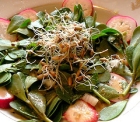Hair And Diet

As with skin, what you eat affects your hair. Hair follicles rely on nourishment from the bloodstream, but they compete with the rest of your body for nutrients. It is a fact what you eat affects the quality of your hair. The hair follicles rely on the nourishment from the blood stream, but they also compete with the rest of the body for nutrients. If you don’t have healthy food and your diet is lacking, then your hair misses out on nourishment, and the result is that the hair becomes dry and the hair growth becomes slow. Sometimes hair does not grow, no matter how much money you spend on supplements to make it grow. The hair lacks lustre, is dull and slack and it is thinning. It makes sense that just as we take care of our bodies we should take care of our hair. However, we often forget the diet factor that is involved in the health of our hair. It is not enough to use good product. Along with that, our hair needs a proper diet. Set out to make sure you eat a healthy diet but remember no amounts of nutrients can repair hair which is damaged by chemicals or split. However there are other ways by which you can help keep your hair in good condition.beating this is simple – just make sure you eat a well balanced diet rich in fruits and vegetables, with at least two servings of protein a day and large amounts of energy-giving wholegrain carbohydrates. One of the most important things that you can keep in mind for your hair is adding high quality antioxidant foods to your diet. This will give nutrition to the entire body and you hair will get a fair share of it too. It will then start growing at a maximum speed, giving it strength and thickness. Also drink a lot of water to keep your hair hydrated and silky.

Different Types Of Hair And Dietary Needs:
Oily Hair: Oily hair is something that most people deal with at point of their life. Oily hair is caused by an over production of oils in the glands near the hair follicles. Many people find oily hair very distasteful, since it has a strange texture and it tends to get limp and lanky. Although oily hair is linked to genetics and hormones, oily hair can be kept under control. Check your spice intake. Foods that cause the skin to sweat like curries or chilli also cause the scalp to sweat and this increases oil levels. A healthy diet can restore balance to your hair and scalp’s natural oils. Avoid excess fatty and oily foods, increase your intake of vitamins, minerals, proteins, fresh fruits and vegetables to restore natural healthy levels of bodily oils.
Dull Hair: Lack of shine in your hair means that it is not reflecting the light properly. Healthy hair is formed with a flat cuticle, and when light rays hit this they bounce back. That is what creates the shine. While chemical processes like bleaching are the most common cause, lack of protein also causes the hair to grow dull. Fats are very important in helping the secretion of natural oils in the scalp, which help give it shine. Absence of these soluble vitamins cause the hair to start looking dull and limp. Add clarified butter to your diet, since it nourishes the hair very well. Eat a lot of protein food like lean meat, poultry, fish, dairy products, nuts, seeds or pulses.

Dry Hair: Malnourishment is one of the main reasons for dry hair. If you are not eating properly or regularly,, your body does not have the fuel that it needs to maintain a healthy head of hair. If your hair is nutrient deprived, it will become damaged, dry and brittle. Dry hair is one of the common symptoms of essential fatty acid deficiency. This is true if your hair is flyaway and frizzy. A diet high in omega-3 fatty acids is a great way to take care of dry hair. Salmon, halibut and snapper are good choices. Eat more flax seed. It can be powdered and sprinkled on breakfast cereal. Flax seed oil can be used as topping for popcorn, potatoes or anything else you would put butter on. Squash, tofu, walnuts and soyabeans can add to your omega-3 intake.
Hair That Won’t Grow: Hair is basically nothing more than dead protein. Deficiencies in protein can slow the growth process of hair altogether. Vitamin B, is vital for hair growth. It also provides the body with energy and if your energy level is low, then hair growth slows down. Having a lot of protein like liver, fish, eggs, cottage cheese, yogurt, etc helps. Also iron, essential fatty foods, Vitamin E and sulfur helps the hair to grow faster. It is said that caffeine is also beneficial to hair growth. Caffeine blocks out a hormone called DHT which is responsible for male pattern baldness and damage to hair follicles. A good way to get a lot of these foods together is to incorporate them into a big salad.

Thinning Hair: There are many causes for thinning of the hair which include heredity, poor nutrition, medications and stress. A lack or iron, zinc and nutritional foods can all very well be the cause of thinning hair. Natural foods such as grains, fruits and vegetables will help you with your thinning hair. If you are on a crash diet or your endocrine system is not in balance it causes your hair to thin. Eat lots of salmon, carrots, egg yolks and sardines. Silicia found in oats, rice, asparagus, cabbage, sunflower seeds and cucumbers helps for thinning hair.
The main thing is when it comes to your hair, focus on more than just products and supplements. Eating healthy is vital to the health of your hair and will make a tremendous difference to your overall hair. Many of the treatments available today can help prevent further hair loss and promote growth.